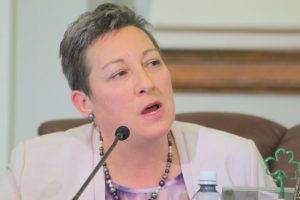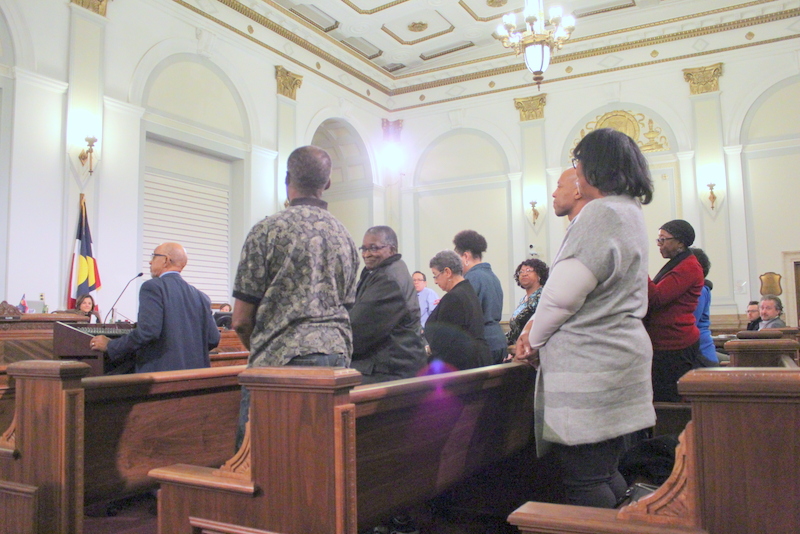
Reverend Dr. William T. Golson Jr. of True Light Baptist Church accepts recognition for 29 years of service to Denver. (all photos: The Nation Report)
Editor’s note: In July of 2016 Denver City Council began hearing its first general public comment session from members of the public speaking for three minutes on city matters of choice, but only during the first Monday meeting of each month. Prior to this new procedure- approved May 23, 2016 – the public was only allowed to comment on agenda items. Because this public comment session is not televised, we at The Nation Report felt it important to document for readers, issues that were most raised by members of the public that follow our mission statement.
To sign up to speak for the public comment session, you can email Legislative Services at dencc@denvergov.org, or call 720-337-2000, or sign up in person in Room 451 of the City and County Building. The sign-up period begins at 12 p.m. on the Friday before the first scheduled council meeting of every month.
Only six people took the available ten spots to speak during Monday’s public comment session of Denver’s City Council meeting.
Danny Lopez is a 15-year city employee and has appeared at the past four city council meetings to raise the same issue: a pay scale that was placed as a temporary measure during a nationwide financial crisis that began in 2007, but is still in place today. Lopez said that then Denver Mayor John Hickenlooper assured city employees that the newly adopted pay scale back then was only a temporary measure.
Lopez, employed in the Public Works Department, and a local teamster local union member. said that Denver Mayor Michael Hancock has produced television commercials that talk about a thriving Denver economy yet city employees, especially veteran employees, are subject to an unfair pay scale.
Lopez said that the middle wage earner has been destroyed in the city and county of Denver. He added that city employees have sometimes not even received cost of living increases yet have to pay more for insurance, benefits, and retirement packages, “I’m asking you to please revise and look at, at least consider getting rid of this temporary sliding pay scale that we’ve worked under for 15 years. We’ve been under it since post 9/11. So we need to look at what went on before 9/11 in our pay scale.” Lopez encouraged other city employees to join a union to protect their wages and benefits.
Ed Bagwell spoke during public comment about the same issue.
Ed Bagwell is the Vice-President of Teamsters Local 17. He spoke about the city’s pension plan that he described as a 2-tier system begun in 2004. Bagwell criticized that the system gives newer employees a lower pension rate than those who started as city employees prior to 2004, “And I get it that it was a cost savings that they were trying to do. Money was tight back then and they were trying to figure out ways to say, ‘Buddy I get it.'” He supported all employees contributing 2% to their pension plans rather than the old plan in place prior to 2004, “But now I think that the city is doing much better [financially]. We’re looking at it to see how we can help get these folks back to that level.”
Bagwell also spoke in support of city employees in the building trades, “The trades people that work in the city do not compare to private sector jobs. We’re losing people from the airport. We’re losing people from all the trades parts throughout the city and now it’s become a dilemma. Because out at the airport, they’re seeing 10-15 trades people leaving and then having to fill those positions. It’s because they’re leaving for the private sector to make more money.”
Neighborhood issues were also a top issue. Frank Locantore said that he is the head of a neighborhood committee that includes a portion of Colfax Avenue. He advocated for a mental health triage that might be a part of a triage that arrives as part of a paramedic team. Given the activity he has seen in his neighborhood and people in need of help, his only option is to call 911 because he said he feels helpless without specific training to help people. His suggestion to council was to provide basic help upon first contact rather than to transport everyone to area hospitals where thousands of dollars might be spent unnecessarily. He also suggested that a triage approach might prove more beneficial than bringing police, paramedics, and the fire department which sometimes all show upon the scene of someone who is passed out.
John Joseph Niemann thanked council member Robin Kniech for attending an upcoming annual meeting of the Inter-neighborhood Cooperation of which Niemann is president. He said that his intention to appear before council was to raise the profile of volunteer organizations and neighborhood organizations that people have relied on for over 40 years, “This is a really important day for us. It’s a way that the INC brings the neighborhood organizations together.”
Niemannn appeared before council to encourage the financial compensation for those who are organizers in INCs and for council to use some of its own resources to help in recruitment efforts and to fund the work of the INCs, “A lot of these [resident neighborhood organizations] are seeing families moving into the city that need to work 2 jobs in order to support their families so they don’t have a lot of time to donate to volunteer organizations like RNO. Many residents don’t have the support structures that they had and young residents have different expectations than what longtime residents had. As well our longtime organizers of the city are aging and even though they are still our leaders they are constantly looking to wonder, ‘Where’s that next generation , where’s that next group of neighborhood leaders that are gonna participate and grow our neighborhoods.'”
Mark Kelley spoke about opposition to an incentive program that he referred to as corporate welfare. He opposed giving taxpayer money to billionaire corporations. “It doesn’t create jobs and/or incentive to invest, and we should stop government handouts to corporations.”
Barbara Fallon pointed out about a “public official” who made an erroneous comment about Donald Trump’s January 27 Executive Order banning those from seven Mulim-majority communities from entering the US. Fallon said that this representative called the ban a “ban on Muslims.” She viewed the ban as not a ban on Muslims, but rather a temporary travel ban that “should have been considered reasonable.” Fallon opposed the idea of adopting Denver as a sanctuary city. Fallon quoted an 80% figure of Americans that oppose sanctuary cities although did not offer a citing for the figure.
In other Denver City Council news, Proclamation 17-0298 received unanimous support from council. The proclamation honored the Reverend Dr. William T. Golson Jr. of True Light Baptist Church for his 29 years of service of “humanity and community.” Introduced by Council Member Stacie Gilmore, she said she has known the reverend for many years and he “speaks his truth and speaks his mind in a very strategic way, and that is a quality that I always admire.” Gilmore thanked both the reverend and his wife for service to the Montbello community of Denver.
Council member Chris Herndon pointed out that True Light Baptist has produced candidates for Governor, US Senator, Mayor, Statehouse, and City Council.
Reverend Golson asked the members of his church to stand in order to recognize their work as well. In accepting the recognition he said, “It’s just a great honor and something I will remember for the rest of my life.”
Proclamation 17-0299 recognizes the St. Patrick’s Day Parade Committee for 55 years of successful parades where Denver’s parade is the largest in the western US. Parade organizers and advocates played bagpipes and danced for council.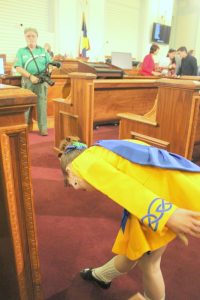
Proclamation 17-0304 was approved in support of National Native HIV/AIDS Awareness Day and National Women and Girls HIV/AIDS Awareness Day. Council Member Rafael Espinoza was a sponsor of the proclamation saying that 1.2 million US residents are infected with HIV/AIDS and 50,000 new infections occur every year – one in four between the ages of 13 and 24.
The Colorado Department of Public Health and Environment reported that at the end of 2015 at least 13,000 people were living with the infection in Colorado, including 36% of all new cases being reported just in Denver County. In Colorado, native communities have the third highest rate of new infections from 2011-2015 and have poorer survival rates after diagnosis. In 2014, HIV/AIDS was the 9th leading cause of death in US Native and Alaskan Natives between the ages of 35-34.
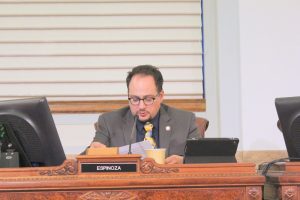 One in four living with HIV/AIDS in the US are women, but disproportionately affecting African American and Latina women who represent 29% of all women living in the US, but account for 78% of HIV cases among women. Council member Espinoza who read the proposal for Council Member Paul Lopez who motioned for the proclamation expressed shock at this statistic, “Discrimination has sort of come to fruition. At a time when groups like Planned Parenthood and funding for women’s health are targeted, I’m worried that this [funding] is going to go in the opposite direction.”
One in four living with HIV/AIDS in the US are women, but disproportionately affecting African American and Latina women who represent 29% of all women living in the US, but account for 78% of HIV cases among women. Council member Espinoza who read the proposal for Council Member Paul Lopez who motioned for the proclamation expressed shock at this statistic, “Discrimination has sort of come to fruition. At a time when groups like Planned Parenthood and funding for women’s health are targeted, I’m worried that this [funding] is going to go in the opposite direction.”
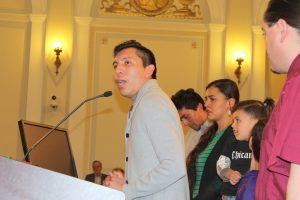 Cafe Cultura, The Denver Indian Family Resource Center , and the Sisters of Color United for Education were all recognized in the proclamation. Alvin Chee, Healthcare Program Manager for the LGBT Community Center of Colorado accepted the proclamation certificate and said that the goal of the Center is to bring the statistics to zero and “that with tonight’s help of the council, the goal is one step closer to reaching that goal.”
Cafe Cultura, The Denver Indian Family Resource Center , and the Sisters of Color United for Education were all recognized in the proclamation. Alvin Chee, Healthcare Program Manager for the LGBT Community Center of Colorado accepted the proclamation certificate and said that the goal of the Center is to bring the statistics to zero and “that with tonight’s help of the council, the goal is one step closer to reaching that goal.”
Ara Cruz, a co-founder of Cafe Cultura hosts a monthly program the 2nd week of the month called Rise Up. Along with other local organizations, the group officer free HIV, Gonorrhea, and Chlamydia testing along with free food. The goal is to protect the community from the illnesses, but also to celebrate the people who continue to “live and thrive with these illnesses.” 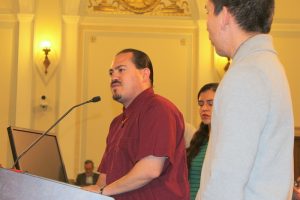
“It’s something to continue with the energy that has built the last couple of years including recently with native people being more present in the national conversation, example being the struggle at Standing Rock and the fight against the Dakota Access Pipeline and to divest from those banks that are funding it. I think it’s definitely a representation of people being visible and present in the public eye.”
The event will take place this Friday, March 10 from 6:30-9:30 at the Denver University Parish, 910 Galapago St., Denver.
Thanks to George Rubenstein who contributed to this report.
